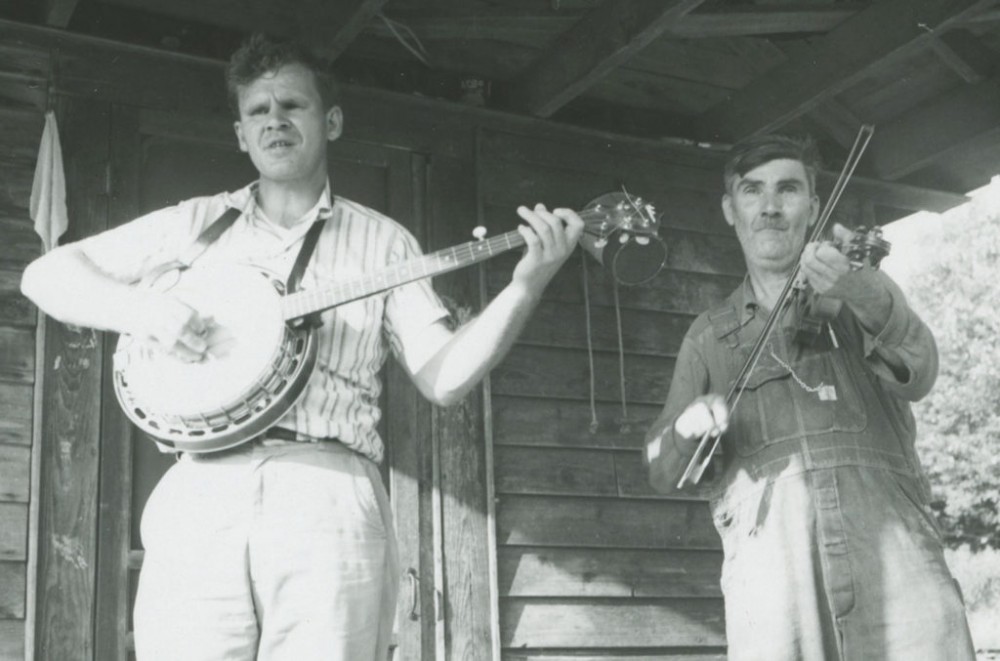Back in the late spring of 1962, folk music enthusiast Peter K. Siegel hauled his Tandberg 3B tape recorder into two New York venues, Blind Lemon’s in the West Village and the Friends of Old Time Music concert at New York University’s School of Education, for shows by Doc Watson and his father-in-law, Gaither Carlton.
And after nearly six decades of personal enjoyment they’re coming out as Doc Watson and Gaither Carlton, a 15-song set whose “My Home’s Across the Blue Ridge Mountains” premieres below.
“I was very much infatuated with this music when I was in my teens,” Siegel tells Billboard. “I was a banjo player, too, and I was interested in recording people. It just so happened that the week I got the Tanberg, Doc and Gaither were going to be in town, so I got permission to record their shows.” The stop was, in fact, North Carolina native Watson’s first New York performance under his own name; He had come before as a guitarist in Clarence Ashley‘s band.
It was after the New York shows that Watson’s star began to rise on a national level, leading to eight Grammy awards (including a Lifetime Achievement prize), an International Bluegrass Music Hall of Honor induction and a National Medal of Arts before his death in 2012, at the age of 89.
“It’s amazing the tape came out at all,” Siegel says of the lo-fi but clear recording. “It was literally the first thing I’d recorded and it was cheap equipment. I’ve loved these recordings for decades. They’ve been in a lot of different apartments and a couple of storage spaces, and once I gave them to a friend to hold onto for a few years. It’s lucky they survived.”
Doc Watson and Gaither Carlton, out May 29 on Smithsonian Folkways with the blessing of Watson’s daughter Nancy, captures a unique period in Watson’s career, capturing him in transition from sideman to frontman and when any kind of greater notoriety was barely a fleeting thought. “This was music (Watson) had made at home with his father-in-law for years,” Siegel says. “It had a kind of warm, family feel to it, and Doc was discovering to his great surprise that people in the cities were really interested in this old time traditional music. But people were just fascinated by this music. They couldn’t get enough of it. Nothing surprised Doc more than that.”
Siegel says that the set is notable as a live recording with Carlton, a fiddler and banjo player who was well-established in Appalachian music circles who until that point had rarely performed outside of North Carolina. “I have friends who are of the belief Gaither Carlton was tragically under-recorded,” Siegel notes. “I think this really captures a special, unique moment that hasn’t been heard very much over the years. (Watson) does display some of the virtuosity that he showed on later recordings, but it’s a little less flashy. It’s all geared towards accompanying Gaither.”
This album’s appearance, of course, does beg the question of whether Siegel has more tapes to share from Watson and other early Americana artist. “Let’s just say there was a lot of music that was performed at those concerts that were not fully captured on tape in a way that you can put them on a record,” Siegel says. “I just put a mic on stage in front of them. Sometimes they were near it, sometimes they weren’t. Sometimes there were disruptive noises in the room, sometimes they were halfway through a song and I ran out of tape. I basically picked the (songs) I thought best illustrated the music and represented them in a way people can enjoy. I think I got most of the stuff on there that I would want to see on a record.”



